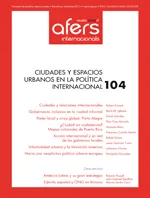Local power and global crisis: changes in Porto Alegre city trajectory

The nation-state crisis and the privatisation of state enterprises in the recent period of neo-liberal globalisation constituted the foundations for the minimum State. Global cities and transnational enterprises were the agents of this neo-liberal globalisation, which gave rise to the prominence of local power at the expense of the nation-state. However, the 2008 financial crisis restored these political agents, and the nation-state re-emerged as an important agent in the globalisation arena. Taking the city of Porto Alegre (Brazil) as a case study, this article aims to present a comparative analysis of the sources of funding for the main urban works during the periods 1990-2008 and 2008-2013, as well as the city’s increased international presence thanks to its participation in United Cities and Local Government (UCLG).
Key words: globalisation, cities, nation-state, local power
The full text articles of this issue are available only in Spanish language